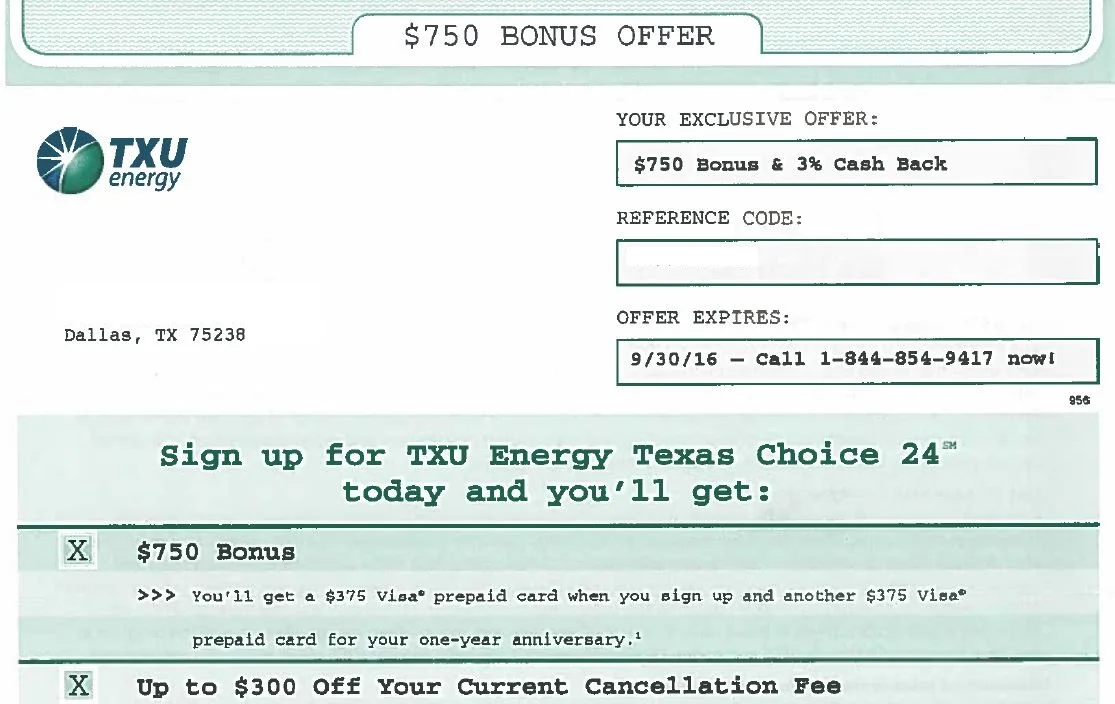TXU has a new offering this spring called Free Nights & Solar Days. TXU says, "This is the best of both worlds – our customers get the free electricity they love along with the added benefits of renewable energy. Because this plan doesn't require rooftop solar panels, it's an easy way to take advantage of the sun regardless of whether you live in a house or an apartment." Wow, that sounds attractive, but…is it?
This plan is similar to the TXU Free Nights Plan that we reviewed last year, but the energy comes from 100% renewable energy sources instead of mostly non-renewable energy sources. For “green” Texans who prefer wind and solar energy over non-renewable energy, this sounds attractive, exciting, and new. However, 100% wind/solar plans are not new at all; most other electricity companies offer them too. In fact, over 20% of the plans available in Texas source 100% of their energy from wind and solar farms.
Unfortunately, like the Free Nights Plan, the Free Nights & Solar Days Plan is deceptively expensive. TXU customers receive “free” electricity from 9 PM to 6 AM under this plan, which sounds great, but it’s critical to understand the cost of the plan during the day. In the Oncor area, the daytime cost/kWh of this plan is 19.2 cents/kWh (including all REP and TDU fees) if you use 1,000 kWh/month. For reference, Energy Choice Experts clients paid on average 6.3 cents/kWh in 2016. The daytime cost of the TXU Free Nights & Solar Days Plan is triple the cost.
But wait—could you come out ahead on the TXU Free Nights & Solar Days Plan by moving your electricity usage from the daytime to the nighttime? Can getting enough “free” nighttime electricity outweigh the daytime cost of 19.2 cents/kWh? That’s what TXU wants you to think, but is it realistic or even possible?
The TXU plan gives you 9 “free” hours of electricity. According to the TXU Electricity Facts Label, the average person uses 32.7% of his electricity during these 9 hours. What if you were really diligent about not using electricity during the daytime and ran your appliances at night? Well, except the refrigerator; it has to run 24 hours a day. What about the A/C in the summertime? How many Texans could wait until “free” electricity starts at 9:00 at night to start cooling down their 110 degree homes? What about the summer weekends? Who wants to sweat in the house all day? Sounds tough.
So we calculated exactly how much of your electricity usage would have to be used at night for the TXU plan to be more economical than plans recommended by Energy Choice Experts. Turns out that a household using 1,000 kWh/month could come out ahead using the Nights & Solar Days Plan, but only if more than 73% of electricity used in the household were used at night.
Let’s be real. How many people can use 73% of electricity during the 9 “free” hours and only 27% during the other 15 hours of the day? We are not saying it isn’t possible, but you’d have to be obsessed with your energy usage and you’d have a scorching hot home until 9:00 every night of the summer. Nobody wants that kind of hassle when there is a cheaper alternative that allows you to use electricity at your convenience.
Energy Choice Experts is here to keep our clients from falling for gimmicks like “free” nights. Provide us with your last 12 months of usage and we'll give you the straight answer on your Lowest Annual Cost Energy Plan for a one-time fee of $35. We guarantee that you can't find a lower annual cost plan than we can.
For Texans who want to sign up for wind and solar plans, we already provide those options as part of our standard service. These “green” plans often cost a little more than non-renewable energy plans, but we show you how much more they will cost for the year and let you decide if you want to pay a premium. TXU is not the only company that offers wind and solar energy; they are just the ones that spend the most money marketing these plans.
Energy Choice Experts can help you save some green and still be green.







